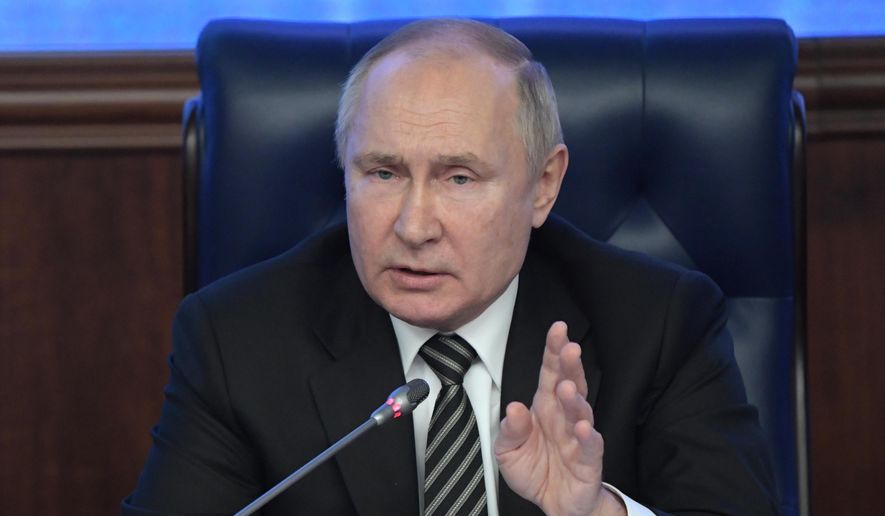Republican lawmakers are calling on President Biden to clamp down on Russia amid a series of high-stakes talks aimed at cooling tensions with the Kremlin.
Top Republicans on the House and Senate military and foreign affairs committees say the Biden administration’s strategy toward Moscow has been “nothing more than a campaign of appeasement” as Russian President Vladimir Putin has ramped aggression toward the U.S. and its European allies.
“The Biden Administration has yet to impose a single meaningful sanction against Russia and paved the way for the completion of Nord Stream 2, a malign geopolitical project run by a Putin crony,” the lawmakers said Monday in a statement. “Meanwhile, Putin has continued to stoke instability in Eastern Europe by illegally occupying Crimea, providing cover and supplies to Russia-backed separatists in Donbas, continuing cyber-attacks against Kyiv, ordering an ongoing assassination campaign throughout Europe, and weaponizing migration and energy.”
The statement was signed by Sens. James E. Risch of Idaho and James M. Inhofe of Oklahoma, the ranking members of the Senate Foreign Relations and Armed Services committees, respectively; and Reps. Michael T. McCaul of Texas and Mike Rogers of Alabama, the top Republicans on the House Foreign Affairs and Armed Services committees, respectively.
Russia has amassed about 100,000 troops on its border with Ukraine, stoking fears of an invasion similar to its 2014 annexation of the Crimean Peninsula and driving negotiations between the U.S. and its European allies and the Kremlin this week.
Last month, the Russian Foreign Ministry published a draft treaty laying out a list of demands for the U.S. and NATO ahead of the talks.
SEE ALSO: Fears of Ukraine invasion rise as Russia talks fail to reach breakthrough
Russia has demanded that the U.S. and NATO deny membership to Ukraine and roll back military levels in Eastern Europe. It also has asked the U.S. not to build any military bases in countries that were former members of the Soviet Union and not part of NATO. Both remain non-starters for the U.S.
Fears rose Wednesday that Mr. Putin is intent on invading Ukraine, as U.S. and NATO talks with Russian officials failed to produce a commitment from Moscow to draw down its troop buildup along the border with the developing, U.S.-aligned democracy.
The Biden administration and top NATO officials sought to put a positive spin on the high-stakes talks. Analysts warned that the Kremlin has exploited meetings this week in Brussels and Vienna to buy time to prepare for a move against Ukraine.
Deputy Secretary of State Wendy R. Sherman, head of the American delegation, told reporters that U.S. and NATO officials stood firm in rejecting key Russian security demands for easing tensions over Ukraine but left open the possibility of further talks with Moscow.
The special meeting in Brussels was the first gathering in more than two years of the NATO-Russia Council, which is designed to prevent clashes between the alliance and Moscow. Ms. Sherman framed it as a “remarkable expression of the power of diplomacy.”
Republicans and some Democrats on Capitol Hill have been critical of the Biden administration’s posture toward the Kremlin even before tensions boiled over.
Over the summer lawmakers from both parties decried the administration’s decision to waive Trump-era sanctions on Nord Stream 2, the Russian undersea pipeline to Germany. The lawmakers argue that the natural gas pipeline will allow Russia to weaponize its control over the European energy market.
The Senate this week is slated to vote on a measure put forward by Sen. Ted Cruz, Texas Republican, to reimpose the sanctions.
The administration has pushed back on the measure and has lobbied Democrats in the Senate to vote against the measure, saying that imposing the sanctions now would remove significant U.S. leverage amid the ongoing negotiations
The vote puts Democrats, who aim to remain tough on Russia without crossing the administration, in a tough spot.
On Wednesday, Senate Foreign Relations Committee Chairman Robert Menendez, New Jersey Democrat, introduced a measure that would impose sanctions on Russia in the event of an invasion — offering an alternative for Democrats but stopping well short of immediate actions that Republicans say are a must.
“We should impose sanctions on Nord Stream 2 now and immediately provide additional lethal aid to Ukraine, including anti-air and anti-ship weapon systems, as well as reinforce the Eastern flank of NATO,” the Republican lawmakers said in their statement.
“The world needs the Biden Administration to do what they should have done months ago: demonstrate that deterrence comes from strength and that to support Ukraine’s sovereignty you must provide tangible support to its defense and interests,” the lawmakers added. “We urge you, Mr. President, to steel your resolve and back our allies and partners in Eastern Europe before Russia invades, not after.”
• Joseph Clark can be reached at jclark@washingtontimes.com.
• Guy Taylor can be reached at gtaylor@washingtontimes.com.




Please read our comment policy before commenting.